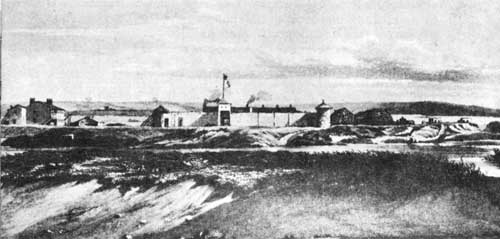|
FORT LARAMIE National Historic Site |
 |

Fort laramie in 1853.
From a sketch by Frederick Piercy.
The Emigrant Tide and Indian Troubles, 1852-53
In 1852, the emigrant tide again swelled to nearly 40,000, over 10,000 of which were Mormons. The emigrants were encouraged to depend on supplies available at Fort Laramie and other posts along the trail. A toll bridge over the Laramie River, a mile below the fort, eliminated one obstacle on the trail, and disease took a much lighter toll of lives.
Beginning in 1850, many of the emigrants on the north bank, or Mormon Trail, stopped crossing to the south bank trail at Fort Laramie and followed a rough, but shorter, route westward along the north side of the river. Those who did not cross with their wagons, however, still found the old ferry across the North Platte a welcome means of visiting the fort for mail and supplies. In 1853, this ferry figured in the first serious Indian trouble near the fort.
The Sioux were becoming alarmed by the great numbers of whites using the Oregon Trail, with resulting destruction of game, and the ravages of new diseases among the tribes. On June 15, a group of Sioux seized the ferry boat, and one of them fired on Sergeant Raymond, who recaptured it. Lt. H. B. Fleming and 23 men were dispatched to the Indian village to arrest the offender. The Indians refused to give up the culprit and fired on the soldiers. In the resulting skirmish, 3 Indians were killed, 3 wounded, and 2 taken prisoner. The Miniconjou Sioux were incensed by this action, but after a full explanation by Capt. R. Garnett, commander of the fort, they accepted their annuities from the indian agent and no further hostilities resulted that year.
In spite of this incident and considerable begging and thievery by Indians, the emigrants had been in little real danger of Indian attack. All this was changed by an unfortunate occurrence late in the summer of 1854.

|

|
|
Last Modified: Sat, Dec 9 2000 10:00:00 am PDT |


